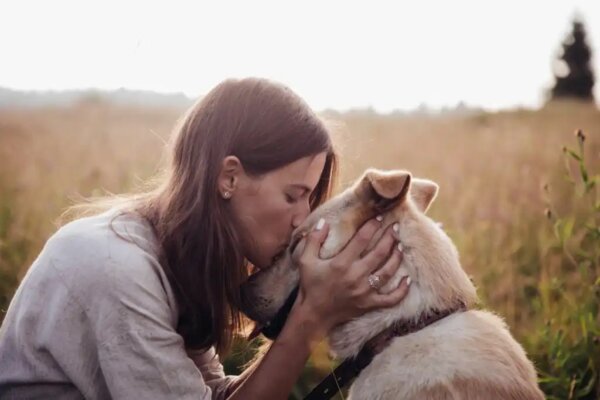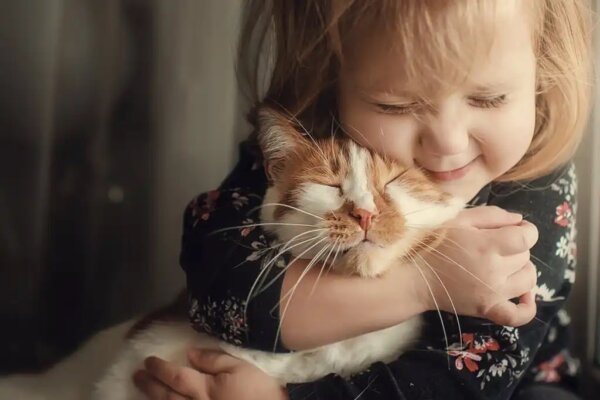Why Some People Love Animals and Others Don't

The love for animals has increased in recent times. Not only are people more aware that animals are living and sentient beings, but also that they deserve respect and have the right to a dignified life. In addition, more and more people are establishing bonds with them. In fact, they often become a member of the family. However, not all people love animals.
Indeed, some people don’t feel any form of empathy or emotional closeness towards animals. Some wouldn’t even consider ever having a pet. Although they wouldn’t ever harm an animal, they simply don’t feel that connection that for others is so rewarding. Why does this happen? Let’s find out.
Where does the love for animals come from?

Characteristics of animals
Throughout history, humans have lived with animals and established different relationships with them. From hunting to domestication, we’ve lived alongside animals for a long time. Furthermore, nowadays, we’re more likely to empathize and care about them.
Northeastern University conducted a study that concluded that people can show more compassion for animals than for their own species. In this study, they showed 256 participants a (false) news story in which a puppy, a dog, a human baby, or an adult had been assaulted and beaten.
Regarding the levels of empathy the volunteers felt for the victim, the adult human fared worst. In fact, the baby, the puppy, and the dog (in this order) aroused the most feelings of compassion and grief. Consequently, it would seem that the perceived vulnerability of animals mobilizes people’s feelings to a high degree. Even higher than that felt for their own species.
Animals don’t possess human reasoning. Therefore, they don’t judge, manipulate, or hold grudges. In fact, they offer their presence, their love, and their company in a pure and genuine way. In other words, they accept us just as we are. That’s one of the reasons why so many people love animals.
Personality traits
People who love animals tend to share certain characteristics. They’re usually sensitive individuals with a strong sense of solidarity and justice. They’re also noble and compassionate.
On the other hand, those who feel no empathy toward animals and those who go so far as to mistreat them are more likely to suffer from psychological and emotional disorders. They tend to be selfish, narcissistic, and ruthless people with a greater tendency to violence toward other humans.
Personal history and background
The way a person has been brought up has a great bearing on how they perceive animals. Children who grow up in a household where pets are considered to be important are more likely, as adults, to be able to appreciate animals, interact with them, and benefit from those interactions.
However, fear or dislike of animals can be acquired by growing up with parents who held these attitudes or by experiencing an unpleasant experience with an animal.

How does our love of animals affect us?
As the French writer, Anatole France said, “Until one has loved an animal, a part of one’s soul remains unawakened”. Indeed, emotional bonds established with animals are extremely enriching and unlike any other. Furthermore, those who live with pets get multiple benefits. For example:
- They become more compassionate and altruistic.
- Their blood pressure reduces, and their heart rate evens out. This considerably reduces stress.
- They have higher levels of feelings of well-being and satisfaction. In addition, their mood improves and they experience more positive emotions.
However, sometimes, love for animals isn’t always so positive. In fact, some people with social difficulties may find in an animal the comfort, acceptance, and companionship they can’t get from other people. Thus, they tend to take refuge in animals.
When this love is excessive, it can damage the individual on a personal, work, social, or economic level. For example, they may start to accumulate animals. This can affect their working life, as well as use up their money and time to an excessive degree.
In short, loving animals enriches us and allows us to develop a unique emotional bond that benefits both our physical and mental health. However, if it should ever start to interfere with our daily routines, we should seek help.
Similarly, people who don’t feel any connection with animals and prefer not to share their lives with them can also live perfectly happily. Because, at the end of the day, everyone finds happiness in their own way.
All cited sources were thoroughly reviewed by our team to ensure their quality, reliability, currency, and validity. The bibliography of this article was considered reliable and of academic or scientific accuracy.
- Levin, J., Arluke, A., & Irvine, L. (2017). Are People More Disturbed by Dog or Human Suffering?: Influence of Victim’s Species and Age. Society & Animals, 25(1), 1-16.
- Arluke, A., Levin, J., Luke, C., & Ascione, F. (1999). The relationship of animal abuse to violence and other forms of antisocial behavior. Journal of Interpersonal Violence, 14(9), 963-975.
- Veevers, J. E. (1985). The social meanings of pets: Alternative roles for companion animals. Marriage & Family Review, 8(3-4), 11–30. https://doi.org/10.1300/J002v08n03_03
- Headey, B. (1999). Health benefits and health cost savings due to pets: preliminary estimates from an Australian national survey. Social indicators research, 47(2), 233-243.
This text is provided for informational purposes only and does not replace consultation with a professional. If in doubt, consult your specialist.








